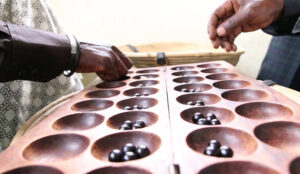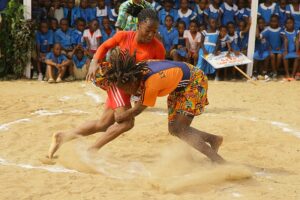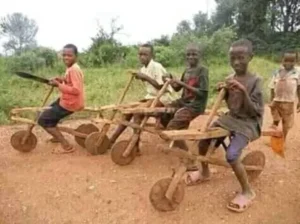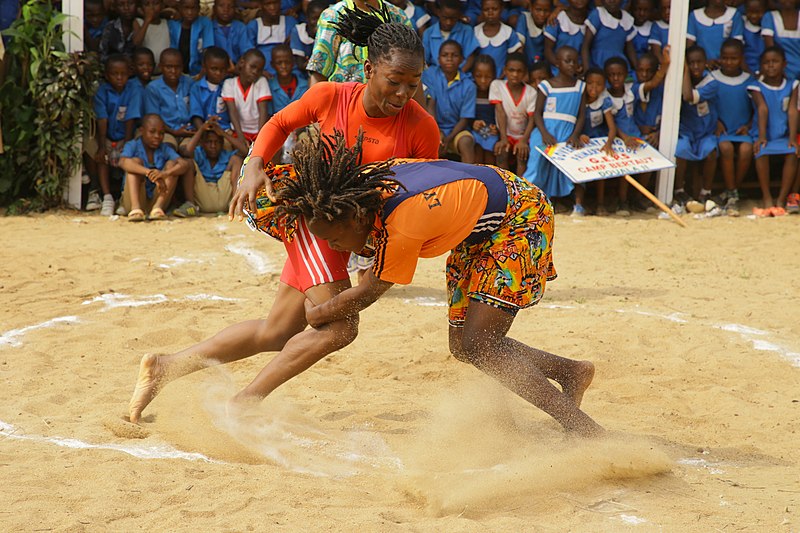In the picturesque landscapes of Rwanda, where verdant hills meet serene valleys, lies a rich cultural heritage that has withstood the test of time. Among the most cherished aspects of this heritage are the traditional games that have been passed down through generations. These games, deeply embedded in Rwandan culture, are more than just a pastime; they are a reflection of community values, resilience, and ingenuity. As Rwanda continues to embrace modernity, there is an urgent need to preserve these traditional games, ensuring they remain a vital part of our cultural identity. This documentary aims to rekindle interest in these games and calls upon all Rwandans to celebrate and perpetuate their legacy.
Gusimbuka Urukiramende (High Jumping)
Gusimbuka Urukiramende or “jumping over long sticks,” is a game that exemplifies physical agility and courage. In this game, sticks are placed horizontally at increasing heights, and participants leap over them without displacing the sticks. Primarily played by boys, this activity is a showcase of athleticism and competitive spirit. Open fields and community gatherings are often the settings for these lively contests, where each successful jump is met with applause and cheer. Gusimbuka Urukiramende is not merely a test of strength; it is a celebration of youthful energy and the determination to overcome challenges.

Kubuguza (Balancing) / Gukina Igisoro
Kubuguza, traditionally known as Gukina Igisoro, is a strategic and engaging game that is widespread in Rwanda and other East African countries. Igisoro is played on a board with two rows of pits (often four to eight pits per row) and a total of 64 seeds or stones. Each player starts with four seeds in each pit on their side of the board. The objective is to capture more seeds than the opponent by strategically moving the seeds around the board.
The game begins with players picking up seeds from any pit on their side and distributing them, one by one, into subsequent pits, including their opponent’s. This continues until the player captures seeds by landing in a pit where certain conditions are met. Gukina Igisoro is more than a game of dexterity; it is a cerebral challenge that fosters strategic thinking, patience, and foresight. It reflects the intellectual rigor and cultural richness of Rwandan society.

Gucamata (Catching and Dodging)
Gucamata is a dynamic game of tag where agility and quick reflexes are paramount. In this game, one player, known as the “catcher,” tries to tag other players within a defined area. The game continues until the catcher tags someone, who then becomes the new catcher. This fast-paced pursuit encourages players to think on their feet and develop their evasion skills. The excitement and energy of Gucamata make it a favorite among children, fostering a spirit of playfulness and camaraderie.
Gukirana (Tug of War)
Gukirana, or tug of war, is a traditional game that symbolizes strength and collective effort. Two teams compete by pulling a rope in opposite directions, each striving to drag the other team across a designated line. This game is a powerful metaphor for unity and teamwork, highlighting the importance of collaboration and shared effort. Success in Gukirana is not merely about individual strength but about the ability to work together towards a common goal.

Gukina Agati (Stick Play)
Gukina Agati involves the skillful use of sticks in simulated combat, often reflecting the movements of warriors. Participants engage in mock battles with sticks, demonstrating their agility, strategy, and coordination. Traditionally, this game served as a form of training for young boys, preparing them with the skills necessary for adulthood. Gukina Agati blends physical activity with imaginative play, embodying the storytelling and warrior traditions of Rwandan culture.
Kwihishana (Hide and Seek)
Kwihishana, or hide and seek, is a timeless game that brings joy to children across Rwanda. One player covers their eyes and counts while the others find hiding spots. The seeker then searches for the hidden players, who try to remain undiscovered for as long as possible. This game promotes creativity, stealth, and strategic thinking, providing endless excitement and fostering the thrill of discovery.
Gutwara Igitogotogo (Wooden Bike Riding)
Gutwara Igitogotogo takes us back to a time when children would ride handmade wooden bikes. These bikes, ingeniously crafted from locally sourced materials, featured wooden frames and wheels. Children would navigate hills and paths on these bikes, showcasing their resourcefulness and coordination. Gutwara Igitogotogo is a nostalgic reminder of the ingenuity and playful spirit of Rwandan youth, reflecting a simpler time when joy was derived from modest, handcrafted toys.

Gutera Umuhunda (Long Stick Tossing)
Gutera Umuhunda is a game that tests strength and precision through the art of long stick tossing. Participants take turns throwing long sticks as far as possible, with the goal of achieving the greatest distance. This game not only measures physical prowess but also the technique and control required to propel the stick effectively. Gutera Umuhunda has historically been a way for young people to demonstrate their athletic abilities and engage in friendly competition.
The Cultural Significance
These traditional games are integral to Rwanda’s cultural tapestry. They are more than just activities; they are lessons in perseverance, community, and respect. Each game reflects the values and traditions that have shaped Rwandan society over the centuries. As Rwanda embraces the future, these games provide a crucial link to our past, ensuring that our cultural heritage remains vibrant and meaningful.
Preserving Our Heritage
To keep these traditional games alive, it is essential for parents, educators, and community leaders to take proactive steps in promoting and preserving them. Here are some ways to ensure these games continue to thrive:
Education: Incorporate traditional games into school curricula and activities. This not only teaches children about their cultural heritage but also provides them with engaging and educational physical activities.
Community Events: Organize community days dedicated to traditional games. These events can foster a sense of community and provide a platform for different generations to connect and share their cultural traditions.
Media Promotion: Use media to highlight these games. Documentaries, social media campaigns, and local TV shows can showcase the joy and cultural significance of Rwandan traditional games.
Workshops and Demonstrations: Arrange workshops where elders can teach these games to the younger generation. These sessions are invaluable for passing down knowledge and skills, ensuring that these traditions continue to be practiced and appreciated.
Cultural Festivals: Include traditional games in cultural festivals and national celebrations, making them a central part of public festivities and encouraging widespread participation.
Rwanda’s traditional games are a vibrant and essential part of its cultural heritage, embodying the spirit and values of its people. As we navigate the complexities of modern life, it is crucial to hold onto these pieces of our past. Let us celebrate and revive these games, ensuring that they continue to bring joy, lessons, and a sense of identity to future generations.
In the words of an old Rwandan saying, “Iby’iwacu biryoha n’ubwo byasize amateka” – “The things from home are sweet even if they come with history.” Let us cherish our games, for they are the threads that weave the rich fabric of our cultural heritage.
Contact us at Hobe News to share your stories, memories, and photos of traditional Rwandan games. Together, we can keep our culture alive.

